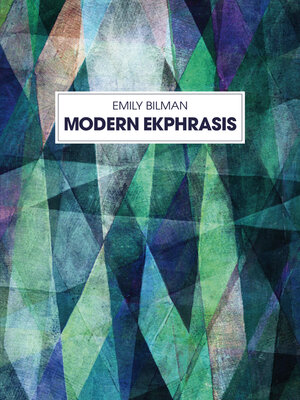
Sign up to save your library
With an OverDrive account, you can save your favorite libraries for at-a-glance information about availability. Find out more about OverDrive accounts.
Find this title in Libby, the library reading app by OverDrive.



Search for a digital library with this title
Title found at these libraries:
| Library Name | Distance |
|---|---|
| Loading... |
Modern Ekphrasis explores the analogical relations between modern poetry and painting in ekphrasis from Horace's mimetic «ut pictura poesis» tradition to Lessing's temporal/spatial antithesis, and the analogy's post-modern deconstruction with Derrida. The genesis of ekphrasis is demonstrated by close analytical readings of modern poems by Howard Nemerov, W.C. Williams, Sylvia Plath, and John Ashbery, mostly written on modern paintings by Paul Klee, Charles Demuth, Giorgio de Chirico, and Frank Stella. In an innovative approach, the author applies Anton Ehrenzweig's concept of «unconscious scanning» to a syncretic visualisation of Klee's Mountain Flora. Viewed with an undifferentiated depth vision that can fix the figure and background in a single glance, Mountain Flora acquires deeper verisimilitude.
The self-reflexivity of the poems which comments on their creative processes and the interrelations of ekphrasis with cognition are analysed after the critical writings of Freud, Panowsky, Gombrich, Hagstrum, Arnheim, Steiner, Ehrenzweig, Derrida, and in the light of the latest neuroscientific discoveries. Homer's shield, Swift's tree, W.C. Williams' pot of flowers, and Ashbery's canvas create a suture within the ekphrastic poem in our imagination. This book demonstrates the evolution of literature and the humanities in our society from classicism to post-modernism which counteracted the self-alienation caused by our modern communication technology by inventing new socio-artistic circuits and new social identities.
The self-reflexivity of the poems which comments on their creative processes and the interrelations of ekphrasis with cognition are analysed after the critical writings of Freud, Panowsky, Gombrich, Hagstrum, Arnheim, Steiner, Ehrenzweig, Derrida, and in the light of the latest neuroscientific discoveries. Homer's shield, Swift's tree, W.C. Williams' pot of flowers, and Ashbery's canvas create a suture within the ekphrastic poem in our imagination. This book demonstrates the evolution of literature and the humanities in our society from classicism to post-modernism which counteracted the self-alienation caused by our modern communication technology by inventing new socio-artistic circuits and new social identities.







